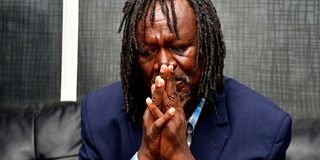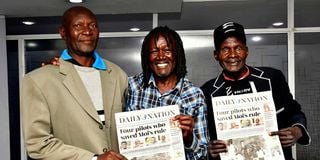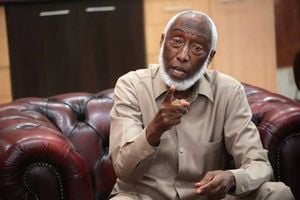
Rtd Senior Private Kipkurui Rotich Yopsoi gestures during the interview on August 1, 2024, where he recounted the incidents of the attempted failed 1982 coup.
Mr Joseph Kipkurui Rotich remembers the events of August 1, 1982, like it happened yesterday.
He breaks into silence during the interview to hold back tears.
“Why would I be interested in overthrowing the government of my fellow tribesman?” he poses.
Throughout the interview, he maintains that he and many of his fellow soldiers were innocent and had nothing to do with the attempted coup.
“Our lives were ruined for something we knew nothing about,” he said.
He said he and his fellow soldiers- he refers to them as brothers- paid a heavy price for the revolt which they did not take part in but were only caught up in it.
Mr Rotich, who retreated to his home county of Kericho after his release from detention recalls that he was the duty crew on the night of July 31, 1982. As the man in charge of the keys to the hanger, his job was to wait for any call or instruction pertaining to the release of aircraft at the Moi Airbase, then known as KAF Eastleigh.
It was around 11 pm when the siren went off and sensing danger, Mr Rotich made a call to his boss, a Captain Kariuki who instructed him to stay put and not leave his post.
But as he waited, gunshots rented the air and he made a second call to Mr Kariuki who maintained his earlier position- do not leave.
When the gunshots became too much, he made a third call but the line had already been disconnected. He then decided to walk towards the armoury, which was about 100 metres away and on the way, he saw dead bodies of fellow soldiers.
On reaching the armoury, there was another body and a fellow soldier. A few steps later, a colleague who was guarding the armoury was bleeding. Bullets of all calibres were scattered across the room but there were no guns in sight.
“I disobeyed the order to save my life as the gunshots were too much,” he said. He then hid himself in a trench for a few hours before he decided to head to his living quarters.

From left: Rtd Senior Private Manase Tembesa, Rtd Senior Private Kipkurui Rotich Yopsoi and Rtd Senior Private Robert Mugambi Karuaki hold a copy of the Daily Nation newspaper on 1 August 2024.
On the way, Mr Rotich said he saw a white vehicle approaching and it was being driven by Private Hezekiah Ochuka and a politician was seated on the passenger’s seat.
A colleague he recognised as Johnson Bor, was seated at the back. Bor alighted from the vehicle as Ochuka drove off. They headed to the quarters and changed to civilian but were forced to put on their uniforms when a hovering helicopter above started raining bullets towards them.
They headed towards the main gate only to be targeted once again.
He says he snatched a rifle from a fellow soldier and aimed at the man shooting from above and the helicopter vanished.
The move gave them a chance to head to their houses and change once again to civilian before jumping the fence and heading to Eastleigh section 3, to a building that housed a cinema hall called Suncity. Soldiers used to frequent the hall during their free time, he said.
From the building, they could see the airbase and were shocked to see army men dropping bombs at the communication centre and a swimming pool. By then it was around midday and they decided to walk away and found themselves near Makongeni in Eastlands, where they were arrested by their colleagues from the army.
One of the soldiers arresting him recognised Mr Rotich and recalled that a few weeks earlier, he had turned down his request to fly a chopper, which he said was faulty as one of the engines was leaking.
“He immediately recognised me and he hit me with his gun butt asking me where the helicopter I was “flaunting about the other day is.”
Mr Rotich passed out and he was thrown into a lorry and driven to the Department of Defence (DOD) headquarters in Hurlingham.
At DOD, one of the senior military officers, a fellow Kalenjin, told them to face the wall, ready to shoot them dead. “He whipped out his pistol but Bor and I turned around and pleaded with him to spare our lives,” he said adding that he made the pleas in his dialect adding that they were ready to be killed facing him and not away. They were then ordered to strip naked before they were slapped, kicked and gun butted while calling them “cowards and educated rubbish”.
He said the officer was taken away by his colleagues. The torture then started. They were then driven to Kamiti Maximum Prison where they were terribly battered by prison warders with batons. The Israeli-trained flight technician says they were then distributed to various prisons with him taken to Naivasha where they were thrown into water-logged cells.
“They would then call one after another to extract a confession. I was among the last persons to be called,” says the 66-year-old former soldier.
He said the treatment meted on them was inhumane as they were stripped naked in public, being frog-marched on their knees on concrete floors, being whipped, kicked and bludgeoned all over their bodies and taunted with insults.
Although he was beaten senseless, Mr Rotich recalls a Colonel Odembo, from Kenya Army, saying the man went through hell just because he was a Luo.
“I tremble whenever I remember what I saw and what they were doing to him,” he said.

Rtd Senior Private Manase Tembesa (left) gestures during the interview on August 1, 2024 where he recounted the incidents of the attempted failed 1982 coup. With him is rtd Senior Private Kipkurui Rotich Yopsoi.
Mr Manasseh Tembesa, who was in the catering department at Nanyuki- now Laikipia Airbase says he was caught unawares and he suffered for an offence he did not commit.
Mr Tembesa, who was taken to Naivasha prison and was sentenced to three months, says he was given Sh50 upon his release and he had to put up with a relative in Nairobi before heading to Mombasa to search for a job.
“Getting a job was not an easy task. We were monitored everywhere we went and no one wanted to associate with us,” Mr Tembesa said.
Mr Rotich was among the group of soldiers who sued the government and were awarded Sh2.5 million each for damages.
They are still, however, yet to be paid and are worried they might die before getting the compensation.
While ordering their compensation, High Court judge (Late) Louis Onguto said he had no reason to doubt their testimony, of bringing the case three decades later, as a repressive regime was not conducive to the filing of a constitutional claim given that the origin of the claim was a failed coup seeking to overthrow the allegedly repressive regime.
“I hasten however to add that the allegedly repressive regime’s tenure came to a halt in 2002, yet it took the Petitioners another ten years to file suit,” the judge said.
The judge was of the view that the periods of their detention were long and unnecessary and some of them were not arraigned before the court martial.
“It matters little that the Petitioners were servicemen; allegations against them ought to have been investigated and dealt with expeditiously. Additionally, the Petitioners were not being disciplined or under any disciplinary process of the Armed forces to take them out of the ambit of the constitutional provisions,” the judge added in the judgment in 2017.







